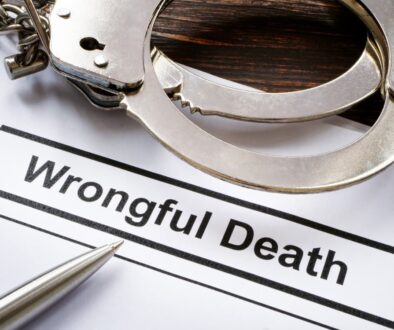What Compensation Is Available After a Wrongful Death in Oklahoma?
Nothing prepares you for the loss of someone close to you. And when that loss could have been prevented, the pain cuts even deeper. Whether it was a distracted driver, a careless doctor, or a business that ignored safety rules, losing a loved one because of someone else’s actions is more than just devastating. It’s unjust, and for families in Oklahoma, it may also be the basis for pursing Oklahoma wrongful death compensation.
In Oklahoma, families who experience this kind of tragedy can pursue a wrongful death claim. While no amount of money can bring someone back, compensation can ease the financial burden, create a sense of accountability, and give families room to heal.
What Counts as Wrongful Death in Oklahoma?
Wrongful death happens when someone dies as a result of another person’s careless, reckless, or intentional actions. The legal standard is based on negligence. If the person who passed away could have filed a personal injury lawsuit had they survived, their estate has the right to pursue a wrongful death case.
These cases arise in many different situations. For example:
- Car and truck accidents
- Motorcycle collisions
- Medical mistakes or surgical errors
- Fatal workplace incidents
- Defective products
- Physical assaults or criminal acts
The official law that guides these claims in Oklahoma is 12 O.S. § 1053A. It states that a “personal representative” can bring a lawsuit on behalf of the deceased person’s estate. That might sound like legal jargon, but it simply means that someone, usually a close family member, has the right to speak for their loved one in court.
Who Can Bring a Wrongful Death Claim?
The court system doesn’t allow just anyone to file. Oklahoma law (58 Ok. Stat. § 58-11) says the lawsuit must be brought by the personal representative of the deceased person’s estate. If there was a will, this is usually the person named as executor. If not, the court may appoint a family member to fill that role.
This representative might be:
- A surviving spouse
- An adult child
- A parent or guardian
- Another relative named by the probate court
Even in heartbreaking situations, such as when an unborn child passes away, Oklahoma law still permits the parents or grandparents to file a claim under 12 O.S. § 1053(F). And in some cases, if the person responsible for the death has also passed away, their estate can still be held accountable.
A wrongful death attorney will help you prove all the requirements and elements necessary for a wrongful death judgment. At the Aizenman Law Group, our lawyers can get you the justice you deserve and all the damages available to you.
What Damages Can Be Recovered?
Wrongful death claims aren’t just about money; they’re about recognizing the impact someone’s absence has on those they left behind. But to get the court to award damages, under Oklahoma law (12 Ok. Stat. § 12-105B) the family has to prove what was lost, both financially and emotionally.
Here’s a breakdown of what compensation may be available in Oklahoma:
Medical Bills and Funeral Costs
If your loved one received medical care after the injury but before they passed away, those treatment costs may be recovered. That includes emergency room visits, surgeries, hospital stays, and even hospice care. Burial and funeral expenses are also recoverable, no matter who paid them.
However, keep in mind that any money awarded for these expenses will go back to whoever covered the costs. So, if a family member paid out of pocket, they can be reimbursed.
The Deceased’s Pain and Suffering
If the person who passed away was conscious after the accident or injury, and experienced fear, physical pain, or emotional distress, Oklahoma law allows the family to pursue compensation for that suffering.
Proving this typically requires:
- Medical records
- Doctor testimony
- Witness statements
As a result, these damages go to the estate and are distributed to the deceased’s heirs.
Loss of Consortium Damages
The deceased’s spouse can claim this if the person was married. Beyond grief, it compensates for the significant loss that the law recognizes is caused to the spouses of the deceased. Consortium is a non-economic damage, and so, it seeks to compensate for things like loneliness, loss of affection, and a general decrease in the quality of life for the spouse.
Loss of Companionship

Spouses may receive damages for the loss of emotional connection, support, and intimacy. Children and parents may also recover for the loss of guidance, affection, and presence.
Oklahoma courts recognize that grief can’t be measured in dollars, but they do try to place a value on what was lost—based on the relationship and the depth of the bond.
Lost Income and Future Support
One of the most significant parts of a wrongful death case is lost financial support. This covers the income the deceased would have earned if they had lived a full life, including:
- Wages and salary
- Retirement or pension benefits
- Health insurance coverage
- Contributions to the household
The calculation depends on the person’s age, job, career path, and expected lifespan. Expert witnesses may be used to provide financial projections.
Punitive Damages
In especially egregious cases, like drunk driving crashes or reckless corporate negligence, the court may award punitive damages. This is a way of punishing the person or company that caused the death and sending a message that this kind of behavior won’t be tolerated.
Punitive damage isn’t automatic. The court must find that the actions involved a willful disregard for safety or an intentional act. These awards are guided by 23 O.S. § 9.1, which outlines the factors the court considers.
Legal Costs
Finally, if your case is successful, Oklahoma allows you to recover the cost of bringing the lawsuit itself. This includes attorney fees, court costs, and filing fees.
How is Compensation Calculated in an Oklahoma Wrongful Death Lawsuit?
Depending on the damages that can be claimed, each category is calculated differently.
Economic Damages
Things like medical bills, funeral expenses, and lost wages are relatively straightforward. They’re based on actual costs, receipts, and future earnings projections.
Non-Economic Damages
For emotional loss and pain, the courts use two common methods:
Per Diem Method
This approach assigns a daily value to the grief or suffering and multiplies it by the number of days it’s expected to last.
Multiplier Method
The court calculates total financial losses, then multiplies them by a number (usually between 1 and 5) based on how severe the loss is.
For example, if a person would have earned $500,000 over their lifetime, and the court applies a multiplier of 3, the non-economic damages could total $1.5 million.
Why You Should Work With a Wrongful Death Lawyer
These cases are rarely simple. Insurance companies often try to downplay the losses or shift blame onto the deceased. Gathering the right evidence, navigating probate court, and proving the value of a human life all require legal experience.
A skilled wrongful death attorney can:
- Help families understand what damages apply
- Build a case backed by expert testimony and documentation
- Negotiate directly with insurance adjusters
- File the claim before the 2-year statute of limitations expires
At Aizenman Law Group, we’ve helped many Oklahoma families get answers after an unexpected loss. We know what it’s like to feel overwhelmed by both grief and the legal process. Our goal is to ease that burden and pursue full justice on your behalf.
When to Call a Tulsa Wrongful Death Attorney
If someone you love has died because of someone else’s negligence, don’t wait to explore your legal options. The sooner you act, the easier it is to preserve evidence and protect your rights.
Call Aizenman Law Group at 918-215-8856 any time day or night for a no-cost consultation. You’ve already suffered the unimaginable. Let us help you take the next step forward.





